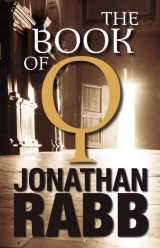
Текст книги "The Book of Q"
Автор книги: Jonathan Rabb
Жанр:
Триллеры
сообщить о нарушении
Текущая страница: 25 (всего у книги 28 страниц)
Gazing down at her, he realized how scared he had actually been. To lose her again.
“No cot for you,” she said.
“I need to stay.”
“No, you need to go.” She waited. “I want my son back, Ian. No more little shrines. If what’s in the box can do that, then you have to go and do that. Okay?”
Pearse looked into her eyes. “I need you to know-”
“I do. I know.”
For several minutes, neither said a word.
“Ivi and I will be just fine here, won’t we?”
Ivo pressed his head closer into her.
Again, Pearse said nothing. He leaned over and kissed her. Pulling back, he ran his fingers along her cheek.
Finally, he stood and looked over at Ivo, happily tucked into his mother’s neck.
“I’ll see you soon, little man.”
Without moving, Ivo looked up at him.
“Keep an eye on Mommy for me, okay?”
Ivo smiled.
What more did he need than that?
seven
The last day and a half had been nothing short of a miracle, the first bombings-including the devastation at the Vatican-merely a prelude to the madness of the past nine hours. The wave of fear, mixed with outrage, was producing a kind of support Harris had never experienced in all his years connected with mass movements. Even the millennium nuts were getting involved. Religious commitment-whose death the pundits had been tolling for years-was having a genuine rebirth. Spontaneous rallies were springing up all over the place, doctrinal defensiveness evidently inspiring action. And what had begun with groups in the hundreds-petitioners in city squares, others outside state assemblies demanding greater “spiritual” security-had grown to ten times that number in a matter of hours.
And everywhere that blind hatred and moral indignation were commingling, the alliance was there.
Faith with firepower.
Those not so fortunate to share in the right system of belief were starting to feel the repercussions. Incidences of violence against Arab, Indian, even Chinese communities were occurring in every major city in Europe, as well as in the States. Kreutzberg, a section of Berlin, with the largest group of Turks outside of Turkey, had been the target of prolonged rioting. Stateside, several of the more outlandish radio personalities had taken to reminding their listeners not to forget who would benefit most from a clash between Christians and Muslims. Why not include an old favorite in the new brand of anti-Semitism?
In the meantime, Harris had been called by the PM to help devise a plan for calming the growing hysteria. Ten Downing Street was told it would have to wait. Harris needed to put the finishing touches to a Saturday-afternoon rally at Wembley Stadium. He’d been planning it for months-at the time, nothing more than an appearance to coincide with the alliance announcement. In fact, it had been Stefan Kleist who had suggested the date. The original sale of thirty thousand tickets had ballooned to over seventy in the last twelve hours. English television crews had been told to make space for the internationals, the Times Square Jumbotron in New York even promising to broadcast bits of the session.
Evidently, Savonarola would have his day after all.
The three-hundred-mile drive from Visegrad to Zagreb was eerily quiet, everything, Pearse noticed, virtually deserted. It was as if all of Bosnia and Croatia were holing themselves up. And why not? Who knew better how to gear up for the kind of conflict now boiling to the surface than those who had been caught on its dividing line for centuries?
He’d called the hospital twice along the way. Both times, she’d been asleep. Ivo, as well. No reason to bother them. He’d call again.
Pulling off the highway at Zagreb, he made his way to the station. He’d realized an hour back he needed time with the scroll, time to find out what lay inside, and he wasn’t going to get that in the van. It was why he was now opting for the train. More than that, he knew a train would meet far less rigorous security at the border than the van. Why take the risk? Five to midnight, and he was on board the last overnight to Italy, the scroll-wrapped in velvet-tucked deep inside his pack. The iron box, and everything else Ribadeneyra had placed inside it, remained with the van in the parking lot.
Except for the coins. Those he’d saved for Ivo.
Finding an isolated foursome and table at the end of one of the cars, Pearse settled in. He waited until the conductor had made his rounds, then turned to the scroll.
If he’d anticipated any awe or wonder as he undid the straps, he felt almost none. The scroll was no longer a piece of scripture existing in and of itself. It had a far more defined purpose, regardless of the imagined purity of its message. It was simply one more device to be used. And Pearse knew he was no different from the Manichaeans in that respect. They needed it to establish their church; he needed it to save Angeli and get back to Petra and Ivo. Who was to say which was more noble?
No vacuum dome at his disposal, he laid it out as best he could and began to read.
It took him nearly four and half hours to get through it, his only interruption at the Slovenian border some twenty minutes into the trip. The officer had checked his papers, uninterested in the roll of papyrus carefully placed on the table. Given the events of the past day, itwasn’t an American priest-even one out of black clericals-they were concerned with.
After that, he’d sat undisturbed, his astonishment growing with each verse he read. Device or not, the “Hodoporia” was far more than he expected, especially in its last few verses, his own familiarity with them at first unnerving. Almost disorienting. Why would these be in here?Until he realized what he was reading. He’d been so caught up in the Manichaeans that he’d let one of the most obvious choices slip from his mind.
Q.
My God.
Eight hundred and forty-five verses, and he’d only recognized it in the last half dozen or so.
The “Hagia Hodoporia” was Q, from the German word Quelle, meaning “source.” Die Quelle. The answer to a pedant’s dream.
Q.
Staring down at the ancient script, he couldn’t quite believe that this was what he had been after all along. Incredible.
Up to this moment, Q had been nothing more than an hypothesis, a scholar’s way to make sense of the central dilemma in Christian theology, the Synoptic Problem. In essence: if Matthew and Luke had used Mark as a common source (as they certainly had), what, then, of the parallel passages in the two Gospels that bore no connection to Mark? In other words, how could either writer-without ever having seen the other’s work-have come up with nearly identical elaborations in his own telling of the story? How? The only answer: another source beyond Mark. And one which, by definition, had to predate the Gospels.
A source contemporary with Christ, and thus unlike any of the four Gospels.
Q.
Reading through it, Pearse knew it was far more than just another exegetical tool. It stood as the last great mystery, even beyond that of the Dead Sea Scrolls.
A link to the Divine. Jesus’ sayings, untouched, pure, written in His lifetime.
Clarity at his fingertips.
Though no expert, Pearse was familiar enough with the scholarship to recognize Q from several of its final verses: “The Coming of John the Baptist,” “John’s Preaching of Repentance,” “John’s Preaching of the Coming One,” and “The Baptism of Jesus.” Matthew 3:1-17, Luke 3:1-22, the first of the non-Markan elaborations. Later still, the “Inaugural Sermon,” “Jesus on Blessings and Woes,” “Retaliation,” “Judging.” More stories: “Jesus’ Temptation,” “The Healing of the Roman Centurion’s Slave,” “The Exorcism of the Mute.” And, of course, the critical passage for any Q scholar-Luke 10:4–6, Matthew 10:10–13:
Carry no purse, no bag, no sandals; and salute no one on the road. Whatever house you enter, first say, “Peace be to this house!” And if a son of peace is there, your peace shall rest upon him; but if not, it shall return to you.
It was astounding enough to see the verses, one after another, stripped of their usual surroundings, now laid bare on a piece of parchment nearly two thousand years old. The true marvel, though, lay in the earlier passages-the vast majority of the scroll-those that appeared nowhere in the canonical Gospels, and which gave the words a meaning Pearse had never conceived, something to take it far beyond the narrow scope of scholarship.
It wasn’t simply the new collection of Jesus’ sayings, unseen until now, that made it so remarkable, but the structure itself, the form of the discourse, that placed the scroll in a context he couldn’t quite believe. Or perhaps accept.
Q was half Gospel, half diary, one that traced twenty years in the life of a Cynic teacher named Menippus. Like Diogenes-the father of Cynicism, who had walked about with a lantern in broad daylight, looking for an honest man-Menippus was a wanderer, no purse, no bag, no sandals. His mission, to teach the Cynic ideal: flout convention, scoff at authority, disbelieve in civilization itself, and embrace a poverty that could grant freedom and thus a kind of royalty. To be king within a kingdom unknown by those still mired in the excesses of a material world.
A Cynic through and through.
How like another school of thought.
Driven by a force he couldn’t explain, Menippus had set off on his “Hagia Hodoporia” from his home in Gadara-a Greek city east of the Jordan River, overlooking the Sea of Galilee-traveling to points as far west as Salonika, as far east as Jaipur, in India. Along the way, he had lived in Sepphoris, not far from Nazareth, then spent several years with the Nozrim ha-Brit, the Essene community at Qumran-those who had written the Dead Sea Scrolls, the Keepers of the Covenant. But not alone. Never alone:
I found Him when He was but a boy, but with such power, such thought. I knew why I had been brought to His side.
Menippus had wandered with a companion, at first the boy’s teacher, then his student, ultimately his “Beloved Disciple.” Menippus, the man forever unnamed in the Gospels, now revealed in the rolls of the “Hodoporia.”
Q was nothing less than a history of the lost years of Jesus’ life, his development from ages twelve to thirty, all transcribed by the pen of a Cynic teacher.
Pearse sat amazed.
To read the sayings in that context created an image of Jesus he had never seen before:
Blessed are those who have grown confident and have found faith for themselves!
Do not worry, from morning to evening and from evening to morning, about what you will wear. Consider the ragged cloak to be a lion’s skin.
When you know yourselves, then you will be known, and will understand that you are children of the living Father. The task lies within you, the journey yours alone. Do not look to another to find a guide to yourself. He will not be there.
When you make male and female into a single one, so that the male will not be male and the female will not be female, then you will enter the kingdom.
And so with all instruction and teaching, men and women share equally in perfection. In me, there is neither male nor female.
Jesus was, in point of fact, a young Jewish radical firmly rooted in the teachings of a still-thriving school of Greek thought. His mission: to unleash a social experiment based on the rejection of traditional constraints in favor of the individual as part of a wider human family. The rituals associated with eating and drinking, the insistence on a voluntary poverty, the loving of one’s enemies, even the choice of dress that Jesus insisted upon all came directly from the Cynic influence:
And how is it possible that a man who has nothing, who is naked, houseless, squalid, without a city, can pass a life in peace? See, God has sent you a man to show you that it is possible. Look at me. And what do I want? Am I not without sorrow? Am I not without fear? Am I not free?
Diogenes himself might have said it.
What was most clear from Q, however, was how strange the message had become in the hands of the writers of the Gospels and beyond. Not only had they inserted certain events-the Last Supper (and thus the Eucharist) was nowhere to be found in Q-but they had eliminated key sentiments that Pearse could only guess had run counter to the needs of the early church. The role of women as preachers (in keeping with the Cynic tradition), the constant emphasis on the individual’s responsibility to maintain his or her own commitment, all disappeared once out of Q’s hands.
Why no women? Why such import to the Last Supper and the Eucharist? No doubt to confirm the crucial role of the male apostles after Jesus’ death.
And yet, the power structure of an elite corps of disciples had had no place in Q. Menippus had gone to great lengths to recount several sermons by Jesus-still in His twenties-that expressly denounced such hierarchy. His was a populist movement, meant for the people as a whole. Everything about it portrayed Jesus not as a harbinger of a mighty structure but as a railer against such monoliths:
And He said to them, “For what would you find through others that you cannot find in me alone? What walls exist that can house my power? And if they should try, I shall throw down this building, and no one will be able to build it.”
For God does not have a house, a stone set up as a temple, dumb and toothless, a bane which brings many woes to men, but one which is not possible to see from earth, nor to measure with mortal eyes, since it was not fashioned by mortal hands.
It was all too clear that Jesus had sensed His own power, and that He had done everything He could to warn against its misappropriations and abuses. His was a brotherhood of believers, not a church of followers. The true authority came from God alone. The individual’s personal and creative experiences of that faith-not the dictates of an institution-were the catalysts of that power:
For those who name themselves bishop, and also deacon, as if they had received their authority from God, are, in truth, waterless canals.
Here it was, thought Pearse. Faith at its most personal, and thus most powerful. There was no denying the clear condemnation of his own calling. “Waterless canals.”And yet, Q also offered the most perfect affirmation of his own brand of faith, one freed of a structure built around detached hierarchy.
The simplicity of Jesus’ sayings had been lost, funneled through Mark, Matthew, Luke, John, Peter, and Paul to assure the connection with a Messianic past-the prophecies of Isaiah-and to establish the foundations for an infallible church. But had that been the message?
Not according to Q. Jesus as wisdom teacher, yes. Jesus as apocalyptic Savior, no.
Nothing was more clear on that point than the Beloved Disciple’s retelling of his visit to Jesus’ tomb three days after His death:
And at that time, a great noise went up through Jerusalem, a wailing for the death of this Son of Man. And with it came word of a resurrection, His tomb laid empty, His being risen and returned. “But this will not be so,” He had told me, “though some will come to say otherwise. It is but the folly of men to need such signs, their folly to place their faith in the body and not in the spirit.”
In a single phrase, Menippus had brought down two thousand years of church authority: “But this will not be so,” He had told me, “though some will come to say otherwise.”Not from the distance of the canonical or Gnostic gospels, but from one who had spent his life with Jesus, and had been there at the bitter end, and beyond. No need to interpret. No need to explain. No need for a Luther to divine his priesthood of all believers from an ambiguous text. The message here was clear as day. And while Luther’s ninety-five theses had been more than enough to shake the very core of Christendom, here was the Word of Christ, unambiguous and unassailable. Imagine how much more shattering it could be.
Angeli’s words raced back to him: w ithout Peter standing there saying, “I was the first, I can vouch for His return …” without the doctrine of bodily resurrection, there’s no way to validate the apostolic succession of bishops. No way to lay claim to the papacy.
Pull out the pin, and the entire structure falls.
At first, it seemed strange to Pearse that so monumental a shift could require so little ink. More so that Matthew and Luke had so easily glossed over it. But the more he read, the more it made perfect sense. Q wasn’t the story of Jesus the Destined. That was for the Gospels. It was the story of a life built on faith and wandering, of a dream of revolution, inspired by ideas such as love and tolerance and spiritual equality. More than that, it wasn’t advancing an image of Christ that no one had ever seen before-violent or self-serving, or whatever other character flaws iconoclasts had come up with over the centuries to debunk the mythology. It was Jesus at His most essential. The Messiah was still there, but it was a messianic message drawn from the pages of Cynicism, Indian mysticism, and Essene wisdom. Resurrections and the like only distracted from that message. The meaning was in the life, not in the death.
And for Pearse, it made Jesus all the more powerful, all the more holy. Pure divinity.
What Q made abundantly clear was that the revolution wasthe faith-the spirit, not the body-the rest of the structure merely trappings, more for the exploitation of men than for their salvation, something that Pearse himself had always believed. The shift from Q to the Gospels was a shift away from the individual to an overarching and alienating edifice. No wonder the Manichaeans had seen it as the answer to their problem. Here was something to undermine that structure.
And by the fifth century, the church wasthe faith. Topple one, topple the other. It had been no different for Ribadeneyra in the sixteenth. For over a thousand years, Q had truly held that power.
The question was, Could it pose that kind of threat today? Except for the passages on Resurrection, Q put forward an image of Jesus and faith that the modern church would have been only too happy to embrace. Q’s commitment to individual rights and responsibility, and its view of women and their role in the church-anathema to a fifth– or sixteenth-century mind-were perfectly designed to resolve any number of contentious debates now ripping Catholicism apart. And all through the Word of Christ. Where was the hyperasceticism the Manichaeans had promised? Where was the gnosis they said they would be called upon to reveal? Everything in Q was plain as day. The irony, Pearse realized, was that their beloved tract, the scroll destined to bring about the ruin of the church, looked like it might actually be the device to save the church from itself.
That is, of course, if one could discount the passages on the Resurrection. Those were equally unambiguous. And given recent events, Pearse wasn’t sure if the church could survive that kind of assault, real or not.
More than that, he understood why the Manichaeans had gone to such lengths to get their hands on it, especially now. Whatever madness they were planning to unleash would mean nothing without a way to justify the emergence of their unified church, something to show that the old one had been corrupted from the very start. The only response to a world gone mad? Remake the church. Embrace unity through a new notion of faith. No doubt most of the scroll would remain “hidden” or “lost.” Keep only what was necessary. Use Jesus to secure Mani. The Resurrection sections would suffice.
How like the Manichaeans to distort the message in the name of gnosis.
The door to the car suddenly opened, the sound prompting Pearse up from the parchment for the first time in hours. He glanced back, to see another passport controller making his way down the aisle. The Italian border. He looked out the window, the sun already creeping out from behind a group of hills in the distance. He checked his watch: 6:15. He’d been so wrapped up in Q, he’d missed the sunrise entirely. He suddenly felt very thirsty.
“How soon to Trieste?” he asked as the man took his papers.
“About forty minutes.” The man pulled what looked to be a tiny hole punch from a holster on his belt, ready to stamp Pearse’s passport, then stopped. “The Vatican?”
Pearse wasn’t sure how to respond.
“They just announced the body count, Father. Eight cardinals survived.” He crossed himself. “Those people are animals.” A quick squeeze of the imprint.
Pearse crossed himself, as well. “You have to learn to forgive,” he said.
“I suppose, Father.” He handed Pearse the papers and began to move on. “I suppose.”
Trieste came as the man had promised, the station alive with early-morning travelers. Now, back in Italy, Pearse knew he could take the chance on a plane-no computer network checking his passport, no security on alert. Even if the Manichaeans did manage to get hold of a passenger manifest, he’d be in Rome an hour after takeoff, too short a period of time for them to do much about it.
Just in case, though, he’d decided to call in the cavalry. The puzzle was solved. It was time for someone else to put it to use and end this.
Stopping at the nearest news kiosk, he picked up a paper and looked for the private message, the phone number from his “friends in Rome … day or night.” The fact that Salko had cut them off was reason enough to make the call.
He scanned the page. It was filled with stories on the travesties spreading like wildfire throughout Europe, an article on the Vatican Bank and the Syrian infiltration. What an appropriate word, he thought.
But no box.
He flipped through several other papers, the news seller becoming more and more irritated.
“Either buy one or move off,” he said finally.
“Are there any from yesterday?” asked Pearse.
“Yesterday? Why would anyone want-”
“Do you have any papers from yesterday?” he insisted.
The man’s irritation mounted. “I have today’s papers. You want something else, try outside the station. Maybe Buchi’s, two blocks down.”
Five minutes later, Pearse stood inside the small tobacconist’s, walls lined with papers from around the world. The most recent copy of Helsingin Sanomatout of Finland was two days old. He pulled it from the rack and immediately located the box in the lower right-hand corner of the page.
Whatever was on Athos, you
have friends, Father. In Rome.
Day or night: 39 69884728
Pearse scribbled the number on his palm, bought a phone card, and headed out into the street. Within half a minute, he was inside a booth dialing.
A recorded voice came on the line: “We’re sorry. The number you have reached is no longer in service. Please check the listing and try again …. We’re sorry….”
He slowly replaced the receiver.
Why would they have disconnected the line? The answer came to him as he stood there staring at the phone. His window of opportunity had been slim at best, too great a chance that the Manichaeans could trace the number, find whoever had been on the other end, and eliminate them. Once Salko had cut the line, the window had closed.
Flying back wasn’t sounding all that clever now. Without his “friends in Rome,” what exactly was he planning to do once there? Walk up to the Vatican and tell them that the Pope was a Manichaean, but not to worry-the scroll would solve everything? Or better yet, just hand the “Hodoporia” to von Neurath and explain to him that it might not be all that he’d hoped it would be? Nice try, but better luck next time. Now please tell everyone that Islam isn’t our enemy so we can all go home.
For some reason, Pearse started to laugh. It was perfect. A Manichaean dream come true. Everything flipped on its head. Now that he had the “Hodoporia,” he was powerless to use it. It only made him more vulnerable. Flight manifests notwithstanding, the Brotherhood would find him soon enough-here, or in Rome. And if he had the scroll with him, everything and everyone would become expendable. Which left him only one choice: confront them head-on. He picked up the phone and dialed Angeli’s number.
It was the same message as before.
“It’s Ian Pearse. I have the ‘Hodoporia.’” He waited. “Hello…. Hello….”
After fifteen seconds of silence, he placed the receiver back in its cradle. Again he stared at the phone. Then, slowly, he let his head fall back against the glass.
They wouldn’t have….
He suddenly stood upright. Of course. As much as he didn’t want to involve anyone else in this, he really didn’t have any other options. He picked up the phone and began to dial.
He just had to hope Blaney was back in Rome.
“Eight minutes, Mr. Harris.”
A quick nod as he sipped at a glass of ice water, Wembley Stadium packed to the gills beyond the window of the luxury box. Harris waited for the man to leave, then turned and stared out at the crowd. The contessa, seated, kept her gaze on him.
“Your new army,” she finally said.
The hint of a grin. “I don’t think it’s completely mine.”
“Oh, I don’t know. Still, that doesn’t seem to be a concern of yours, does it?”
He looked over at her, momentarily at a loss. “I’m afraid I don’t follow.”
“Don’t you?” She waited. “The churches. The Vatican. You put our money to quick use, didn’t you, Colonel? And here I thought we were talking rhetoric, not mass hysteria. Evidently, I was meant to take the term holy warliterally.”
A slight squinting of his eyes. “That’s not the way I work, Contessa.” When she didn’t answer, he continued. “I won’t say it hasn’t helped things enormously. Hysteria does have a way of rallying the troops. But I won’t take credit for something I haven’t done. I assumed that was your people.”
Not convinced, she said, “And who exactly do you think my people are? Or did Mr. Kleist fail to bring you up to speed on that?”
Again, he waited before answering. “I’m now wondering if I should be asking you that same question.” She said nothing. “I have connections, Contessa, but even I couldn’t organize what’s taken place over the last twelve hours in a matter of days. Something like that takes weeks, if not months, to plan. I can’t say it fills me with confidence to hear that you’re not quite clear on who orchestrated the attacks.” Another pause. “Or perhaps you are, but aren’t willing to admit it just yet?” He placed the glass on the bar. “Either way, I need to get down there.” He moved to the door, then turned. “I suggest you make a few phone calls before all of this gets under way. Oh, and give my best to the cardinal. And my congratulations. Tell him I appreciate everything he’s done.” A single nod of the head, and Harris was gone.
She sat staring after him. She had come to rein him in, make sure he understood his role. What else had the bomb in Rome been but a message, a colonel’s way of reminding them that he knew exactly who, and where, they were? The rest of the churches, she could almost understand, the first seeds of his holy war, misguided or not. Evidently, that wasn’t the case at all.
More troubling was his none-too-subtle reference to Erich. Obviously, Harris hadn’t appeared on Kleist’s suggestion alone, as she had been led to believe.
The crowd roared. She stood and moved to the window. Harris was emerging from one of the runways, bodyguards in clear view. She watched as he made his way toward an enormous structure rising forty feet off the ground at the far end of the field. Two huge screens stood on either side of the raised oval, his entrance beamed out larger than life. A single cameraman led the pack, backing his way up the ramp so as to capture Harris up close. Music blared, grating yet inspirational. Harris waved to the throng. It was clear he’d picked up a good deal from his time in America. The whole thing had that National Convention feel to it. When he finally reached the podium at the center, his entourage fell back, only the cameraman down on one knee to continue the feed. For the contessa, there was something strangely familiar to the man, even from the back, the way he moved, the way his shoulders nestled into the camera. She picked up the binoculars and took a closer look.
Nearly half a minute of wild adulation passed before Harris spoke, the contessa continuing to scrutinize the cameraman.
Harris raised his hand: “My friends-”
He never had a chance to finish. Adulation turned to screams as four cracks erupted over the loudspeakers, the sight of the cameraman racing at Harris, gun in hand, blood everywhere. It was then that she saw it. The hair and skin color were darker, the facial hair, the contours of the face more acute, but it was him, his face screaming wildly, his eyes beyond madness.
Stefan.
An instant later, the bodyguards let loose, the barrage sending Kleist over the platform’s edge. He fell, somehow in slow motion for her, his body arching gracefully until it crashed down onto the field below.
The contessa stared in disbelief. A single phrase fixed in her mind: There’s very little I’d put past Erich now.
Maybe it was time for her to accept that, as well.
“No, take a left there.” Pearse leaned forward in the cab and pointed across the piazza.
“No, no, signore,” said the cabbie. “Avigonesi is on the right.”
“I know. Just take the left.”
With a shrug, the man did as he was told.
Pearse had taken the cab from the airport, his flight and arrival uneventful as far as the Manichaeans were concerned. His sudden change of plans, though, had everything to do with the scroll. He wasn’t going to chance holding on to it for too much longer. Should anything happen, it remained his only bargaining chip. Best to keep it safe. Plus, there was no reason to put Blaney at more risk than necessary.
“Here,” said Pearse.
The driver pulled up along the cobbled piazza; Pearse got out. Three minutes later, he was making his way up the short flight of stairs to the office of the church of San Bernardo. He knocked on the door.
It was half a minute before he heard the sound of shuffling feet. The door opened, revealing the wizened priest, his eyes puffy from sleep, though no less enormous behind the thick glasses.
“Yes. Hello. Can I help you?”








